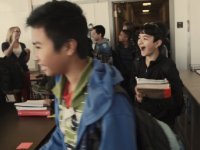Student Choice Leads to Student Voice
By giving students opportunities to produce quality work about issues that matter, we give them access to their passion, voice, skills, and revelation.
Your content has been saved!
Go to My Saved Content.The way I understood school learning shifted the first time I was given an opportunity to design a project of my own. This high school senior project, an environmental audit of my school district, became my passion. I stayed awake at night researching, met with different experts, and ultimately presented a proposal for reform to our school board. For the first time in my life, school had not been about finding ways to meet requirements established by others -- it was about work that I believed in.
Why Choice?
Learning that incorporates student choice provides a pathway for students to fully, genuinely invest themselves in quality work that matters. Participating in learning design allows students to make meaning of content on their own terms.
There are times when students are able to pursue their passions and independently create projects, and other times when students can be given choice in smaller, yet meaningful, ways. The parameters of choice vary depending on the cycles of the school year, the specific students, the project, and many other factors. Regardless of the scenario, maintaining a focus on student choice helps to create learning environments of meaning where student voices matter.
Several of my colleagues at Science Leadership Academy in Philadelphia generously offered to share creative examples of different ways that they structure student choice in their classrooms:
Meenoo Rami teaches students English:
Brad Latimer teaches students math:
Matt Kay teaches students English:
A final example:
In my own classroom, my 12th grade American Government students began the year with an inquiry into democracy and education. The unit began by examining and unpacking different definitions and understandings of democracy. In groups, students then drew their visions of democratic education. The unit continued with readings, videos, and discussions designed to broaden students' vision of and knowledge about education, democracy, and the current crisis in Philadelphia public schools. The students then designed and created digital stories related topics of their choosing. (The collection of videos and a project description can be seen here.) The content in the videos demonstrates a range of student interests and passions. The different video formats provide insight into creativity that results from a project that provided flexibility and choice within a set structure.
Choice, Voice, and Passion
School works when students have opportunities to produce quality work about issues that matter. Education works when people have opportunities to find and develop unaccessed or unknown voices and skills. Audre Lorde poignantly describes this "transformation of silence into language and action [as] an act of self-revelation." Opportunities for flexibility and choice assist learners in finding passion, voice, and revelation through their work.
